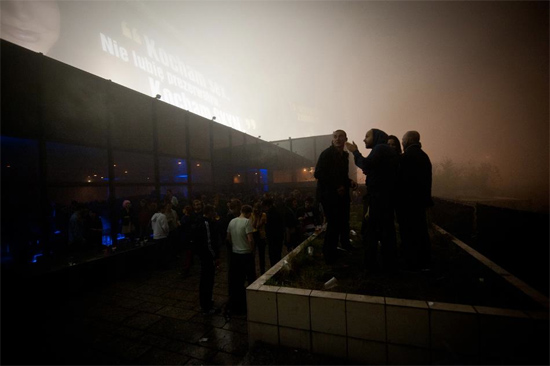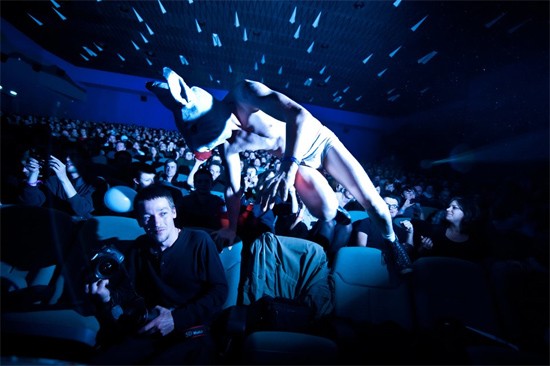Photos by Joanna ‘frota’ Kurkowska
The end is nigh! Or, at least, that’s what Unsound Krakow’s theme and programme would have you believe, peppered with apocalypse-baiting concert titles like "Someone Else Was Dreaming Him" (straight out of a Borges short story), "A Thousand Crashing Cars" (straight out of a Ballard short story), "Behind Their Backs The Great Darkness Began", and "Everything Has Ended, And Everything Ends, or, One Day My Heirs Will Find It". All signs point towards, if not the abject destruction of the world as we know it, then at least a radical upheaval. The Mayan calendar leaves us eight weeks until the deadline hits. Tick tock.
Unsound excels at matching its music and overall atmosphere to its chosen theme – last year’s ‘Future Shock’ took stock of future-gazing tendencies in electronic music from the past 30 years and added a few forward-thinking narratives to the equation – but this year’s, ‘The End’, is even more pleasingly ambiguous than usual. The festival’s organisers seem to be using it as an excuse to take stock of their position after 10 years, and consider how (and, indeed, whether) to go forth from this position: as the closing party draws to a chaotic close, the nagging question on many peoples’ lips is "Have we just experienced the final Unsound?" From an audience perspective the theme is expressed both in the music – there’s plenty of the dark and stern persuasion on offer over its eight-day tenure – and the overall mood, which is far more urgent and intense than last year’s, especially during the Friday and Saturday raves, which are held in the Ballardian ground floor lobbies of a dilapidated hotel and nurture an atmosphere of almost desperate hedonism. It’s the final party before the world draws to a close, everyone – you’d better make it count for something.
But scratch that – perhaps it’s better to take a more optimistic perspective on the week’s events. Only eighteen months or so ago, Simon Reynolds’ Retromania offered a controversial look at pop culture’s end of history: the eternal recycling and recontextualising of material from the past and its re-presentation in the form of an achronological and thus neutered present. Mere months after that book’s publication, one of the major sonic themes running through last year’s future-shocked Unsound was the presenting of forward pathways out of the quagmire of now, in particular via an increasingly intimate association between club and noise musics, where the latter’s abrasive and semi-improvisatory methodologies were being channeled into rhythmic forms that flirted – and sometimes fully engaged – with the dancefloor. (Among those cutting routes into that shared zone of operation were Morphosis, Laurel Halo, Stellar OM Source and Hype Williams).
At this year’s festival that loosely associated set of ideas and artists has crystallised into an even stronger narrative, albeit one bound less by genre than by process and procedure. While always based largely around exploratory and electronic music, at Unsound 2012 club music and the dancefloor feel like more of a looming presence than ever before: shattered into fragments and scattered across scorched earth during Raime’s Saturday evening set in the Engineering Museum, shrouded in clouds of reverb and sticky digital weedsmoke by Vessel, or wracked by gradual erosion (Lee Gamble, whose upcoming 12" for PAN turns old jungle cassettes into murky delights). The presentation – a series of events and a comprehensive talks programme over a whole week that allows attendees to see practically everything on the line-up, and which takes place at a whole variety of venues across the city – serves to strengthen the sense of shared direction and adds potency to the music. Essentially, Unsound’s great strength is that it creates a context for its artists to operate within.

The Hotel Forum
A few, though, present particularly strong signals to latch onto amid the background noise. Holly Herndon, playing on Thursday night in the Manggha museum, creates techno largely through the use of her own voice, passing it through her laptop and digitally splintering it into wordless chants and anguished, asphyxiated wheezes. Although a couple of tracks are driven by clubby rhythms, the most successful are beatless: the early seconds of ‘Movement’, where an anxious acid line pirouettes in free space, or the slow choke of ‘Breathe’.
Later that evening Bristol duo Emptyset, recent signings to the Raster-Noton label, are little short of a revelation. Paul Purgas and James Ginzburg’s modus operandi is one of reduction: using the simplest building blocks possible – sine waves and noise – they map out simple sonic blueprints before savagely distorting and twisting them out of shape with a chain of effects and processors. The effect, both sonically and physically, is like being stood inside a sophisticated piece of modern architecture as it buckles and warps under its own internal pressure. Steel girders smash and blast through glass and concrete; regions of high density crush through more diffuse patches of static, interfering with the music’s internal rhythms; gravel and detritus fizz as they hit the ground. Periods of apparent rhythmic chaos regularly resolve into more regular patterns – slow four-to-the-floor throbs, driving dancers wild, or the heave-and-judder of ‘Aramature’. Behind them, visuals from Joanie LeMercier (of AntiVJ) interpret the music as white-on-black, a series of flickering lines that dance across the screen, and at one point a vertical crack down its middle that suggests a hole torn in the fabric of the universe. What the duo have inherited from their histories in techno and sub-driven dance music (they are from Bristol, after all) is an overwhelming physicality and a subtle – but ever present – connection to the club. I’m stood front right, literally hugging the speakers, as great welts of sub-bass ripple through my body like an earthquake. The hairs on my arm are stood to attention, my stomach appears to have dissolved into my body cavity, and my skin cells are being shaken loose into a thin corona surrounding me. But the pressure is less alienating than inviting, and a full hour passes in a heartbeat.

V/Vm
Somewhat perversely, Emptyset manage to make Factory Floor, who follow immediately afterwards, initially sound small by comparison. The trio’s approach – essentially, to take a four or five note motif and batter their audience into submission with it over extended periods of time, hyper-sensitising dancers until the slightest tweak has a seismic impact on the stability of the dancefloor – is one of gradual escalation rather than immediate gratification. It takes ten minutes before they’re fully locked in, scattering detuned synth pulses outward in interlocking patterns that suggest some advanced form of morse code, occasionally locked down by live drums or Nik Void’s guitar and voice.
In the same venue at a bracingly early time on Saturday afternoon, Container (pictured, top) works a similarly punishing aesthetic, gradually flattening a hungover audience with a set of growling and cantankerous technoise wrenched straight from a tangle of analogue electronics. He debuts tracks from his upcoming second LP, all of which follow roughly similar trajectories, beginning with a rhythm of flat thwacks and gradually acquiring grit, acid and extra percussion until they peak as screeching, ear-splitting beasts. Closer ‘REFRACT’ is one of the most streamlined and predatory pieces of techno I’ve heard in an age, spiraling towards its victim like a Drexciyan military submarine, its clusters of sonar pings gradually honing closer to their target until they lock on and unleash an almighty barrage of distortion. Although on the surface his tropical hothouse grooves couldn’t be more different, even Heatsick’s three-hour long ‘Extended Play’ session later that evening isn’t too dissimilar in terms of approach. Intensely repetitive and addictive, he stretches out his recorded tracks into longform keyboard jams, creating a spiraling vortex of organ polyrhythms and squashed percussion that repeatedly builds to a feverish crescendo before abruptly snapping into the next track.
There’s no shortage of other delights across the course of the week: Ben UFO’s DJ set screaming into the future with a set composed of both old and new music; KTL soundtracking F.W Murnau’s classic silent film Sunrise with tendrils of creeping dread that slowly built to a horrifyingly loud climax (and turning even the film’s most lighthearted sections into shredding ordeals).

V/Vm
But it’s a pair of performances from James Leyland Kirby’s reanimated V/Vm that best capture the festival’s apocalyptic theme. In the sophisticated surrounds of the Kijow Centrum cinema on Friday night, their ‘Proper Kaput’ show is a wholly anarchic riot utterly unsuited to the space, featuring Kirby’s partner-in-crime in a rabbit mask miming to a grotesquely downpitched version of Art Garfunkel’s ‘Bright Eyes’ and a final stage invasion of around 15 friends and accomplices in rubber masks. It’s a further extrapolation of Kirby’s version of ‘Can You Feel The Love Tonight’, which he performed in the same space last year: a glaring light shone onto the nature of fame that makes the audience feel uncomfortably complicit in the unbalanced relationship between performer and observer. The show goes on in the tiny Club Pauza on the final night, with a violently pitched up version of U2’s ‘Beautiful Day’ and a heatsick version of ‘Feel’ as performed by Robbie Williams’ rotting corpse. Kirby’s pop stars are absurd, seedy and desperate for attention, to the point that they barely resemble grounded human beings anymore. It’s alternately sickening, hilarious, thrilling and embarrassing, and when V/Vm punctuate their Sunday night set with sped-up 90s chart trance, it’s clear that the end has already arrived and we’ve overshot it entirely: time has simply arched its back and twisted around on itself like a Moebius strip.


